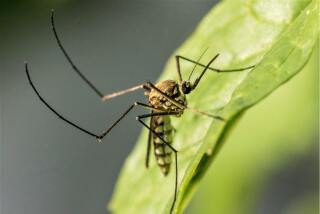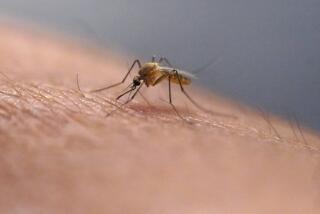West Nile: More fatalities reported in Dallas, Obama briefed
HOUSTON -- North Texas officials on Tuesday announced three more West Nile deaths in what has become the largest outbreak nationwide.
President Obama requested a briefing about the outbreak from officials from the Centers for Disease Control and Prevention, Dallas officials said Tuesday.
âThat just goes to show that this is a serious matter that the president requested and the CDC provided a briefing,â Dallas County Judge Clay Jenkins said Tuesday.
So far, 586 West Nile infections have been reported statewide, with at least 21 deaths. Given diverse reporting practices in Texasâ 254 counties, itâs unclear whether the 21 includes the deaths announced Tuesday.
Thatâs the majority of the 693 West Nile infections and 26 deaths reported nationwide, according to the CDC.
The CDC has dispatched a team of epidemiologists to the Dallas area at the request of Texas public health officials to assist in addressing the outbreak. They were expected to arrive Wednesday, officials said.
Dallas County has reported 262 West Nile infections and 11 deaths, the most recent a woman in her 80s. All those who died have had underlying medical conditions, according to Dallas County Health and Human Services Director Zachary Thompson.
Neighboring Tarrant County, home to Fort Worth, has reported 212 West Nile infections and four deaths, the two most recent a man and woman in their 80s with underlying medical conditions.
West Nile usually peaks in Texas in August, but Thompson told the Los Angeles Times on Tuesday that it was unclear whether the state had reached the peak number of infections yet.
âI think itâs too early to comment on that,â he said.
Dallas County and city officials have declared a public health emergency and started the first four-day aerial pesticide campaign in more than 45 years on Thursday to combat the spread of West Nile by mosquitoes.
More spraying was expected to start as soon as Wednesday.
Dallas Mayor Mike Rawlings said early results showed aerial spraying with the pyrethrin-based pesticide Duet has been a success, âwith no visible side effects.â Due to the state of emergency, the state is paying the $500,000 tab for the spraying, officials have said.
âItâs been the right tactic in minimizing the epidemic that weâre seeing,â Rawlings said during a televised news conference.
But Rawlings said the city planned to hold off on future aerial assaults, focusing on truck and hand spraying and âlarvicideâ -- applying insecticide to standing water to kill larval mosquitoes.
âWe were in the air. Now we go very, very local,â he said.
He noted that since the incubation period for West Nile infections can be up to two weeks, it will take at least that long to know whether aerial spraying made a dent in the number of new infections.
Weekend rainstorms made aerial spraying difficult, and although they may have washed away some mosquito larvae, they likely added to the threat, Rawlings said.
âThe recent rains have created new areas of standing water and thus new breeding ground for mosquitoes,â he said. â...Nowâs the time when neighborhoods need to come together to protect each other and make sure we donât have those mosquitoes.â
He and other officials urged residents to dump standing water, wear mosquito repellent and long sleeves and avoid going out at dawn and dusk when mosquitoes are active.
âThis is literally a matter of life or death,â Jenkins said.
ALSO:
Swimmer Diana Nyad: âI want to go onâ
Day-care workers accused of urging toddlers to fight
Train derails, tumbles from bridge near Baltimore; 2 women killed
More to Read
Sign up for Essential California
The most important California stories and recommendations in your inbox every morning.
You may occasionally receive promotional content from the Los Angeles Times.











